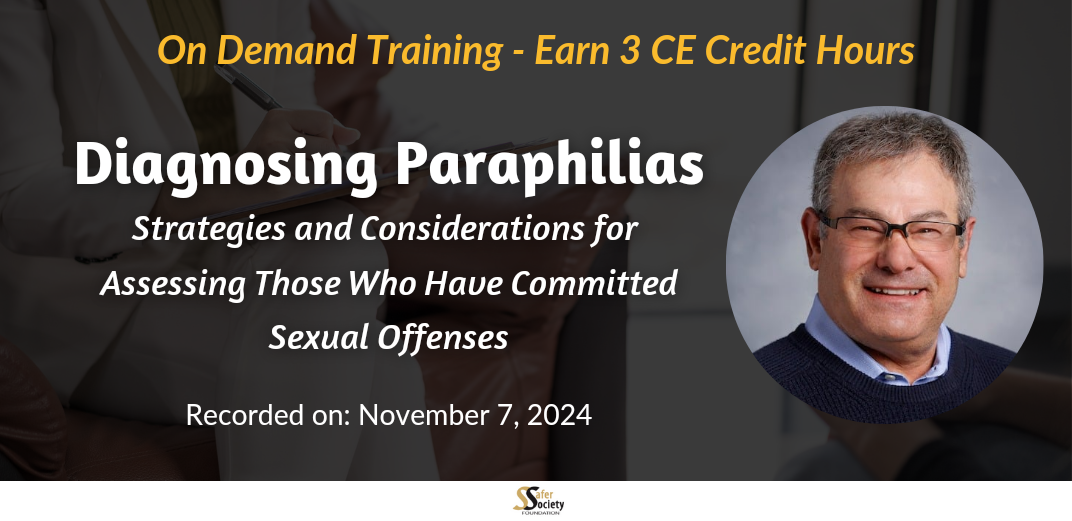
Diagnosing Paraphilias: Strategies and Considerations for Assessing Those Who Have Committed Sexual Offenses
Already purchased an On Demand training?
Click here to access your Safer Society On-Demand Training Center account.
Diagnosing paraphilias can be challenging due to the evolving definitions and criteria across diagnostic manuals, leading to discrepancies in classification and diagnosis. Additionally, distinguishing between paraphilic interests and paraphilic disorders—as well as addressing the potential misuse of diagnostic criteria—further complicates the process.
During this training, Dr. Michael Miner, Emeritus Professor of Family Medicine and Community Health at the University of Minnesota, addresses the criteria and processes of diagnosing paraphilias and paraphilic disorders as described in the DSM-5-TR. He covers historical and current definitions, clarifies the differences between paraphilias and disorders, focuses on pedophilia considerations, and guides attendees through diagnosing various paraphilias, such as sexual sadism and voyeurism, with insights on applying DSM-5-TR criteria effectively.
Importantly, this training explores the misuses of diagnosis, both in terms of misapplied criteria and the use/misuse of the Other Specified and Other Unspecified Paraphilic Disorder categories. Dr. Miner includes a special focus on the specifiers related to coercion and hebephilia. He also explores the use of self-reporting, phallometry, and viewing time measures in making paraphilic disorder diagnoses. This includes a review of the strengths and weaknesses of each of these methods.
1) Explain the difference between paraphilic interest and paraphilic disorder.
2) Describe the criteria for diagnosing different paraphilias and common misdiagnoses.
3) Describe the uses and misuses of Other Specified and Other Non-specified paraphilias.
4) Recognize the strengths and weaknesses of procedures used to aid the diagnosis of paraphilias, including self-reporting, phallometric assessment, and viewing time assessments.
5) Apply the criteria described in DSM-5-TR to rule in or out common paraphilias encountered in assessing and treating those who have committed sexual offenses.
Audience
This training is for professionals working with people who have perpetrated abuse. Professionals who will benefit from this training include social workers, psychologists, clinical counselors, and interested paraprofessionals.
Content Level
Disclosure
Continuing Education Approval
American Psychological Association (APA)
Safer Society Foundation, Inc. is approved by the American Psychological Association (APA) to sponsor continuing education for psychologists. Safer Society Foundation, Inc. maintains responsibility for this program and its content.
Who's Presenting

Michael Miner, PhD
Michael Miner is Emeritus Professor of Family Medicine and Community Health at the University of Minnesota. He began his sexual violence research work in California’s Sex Offender Treatment and Evaluation Project and, since joining the Institute for Sexual and Gender Health (previously the Program in Human Sexuality: PHS), his research has focused on the etiology of sexual abuse perpetration in adolescence, risk assessment, and sexual compulsivity. Dr. Miner coordinated adult sexual offender treatment until 2008 and forensic assessment services until 2020. He is Past President of the Association for the Treatment of Sexual Abusers and past Vice President of the International Association for the Treatment of Sexual Offenders. Dr. Miner was on several editorial boards before retiring and continues on the editorial board of Sexual Abuse. He served as Associate Editor of Sexual Abuse: A Journal of Research and Treatment until 2015 and received ATSA’s Lifetime Significant Achievement Award in 2020.
